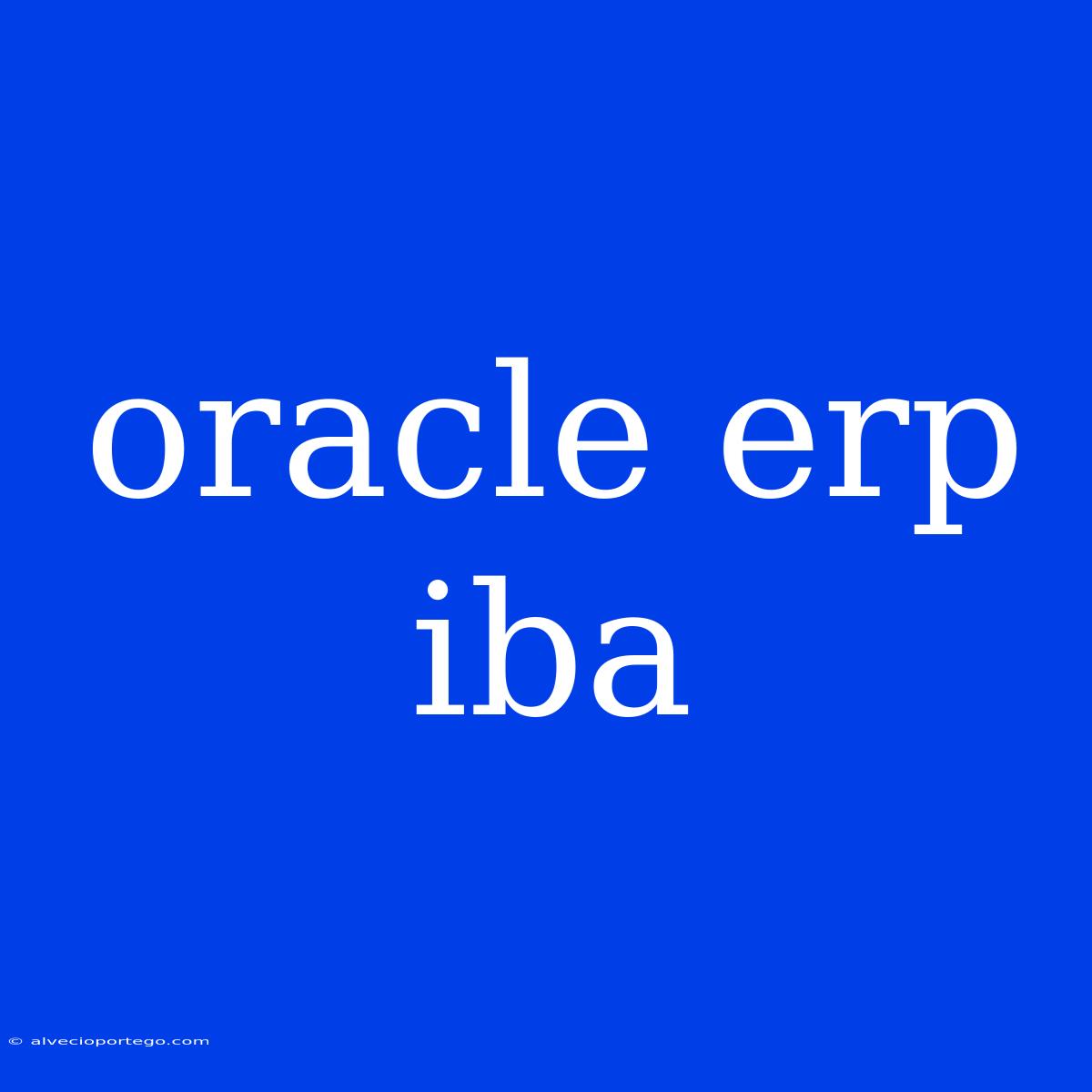Oracle ERP Implementation Best Practices: A Guide to Successful IBA
Oracle ERP implementations are complex and require careful planning and execution. Implementing Oracle ERP with a strong Implementation Best Approach (IBA) can help organizations achieve successful and sustainable results.
This article will provide a comprehensive guide to implementing Oracle ERP with a focus on best practices that ensure a successful IBA.
Understanding the Importance of a Robust IBA
A well-defined IBA lays the foundation for a smooth and efficient Oracle ERP implementation. It encompasses:
- Clear project scope and objectives: Establishing a precise understanding of the project's goals, functionalities to be implemented, and the desired outcomes.
- Detailed planning and timelines: Creating a comprehensive project plan with clearly defined milestones, deliverables, and timelines.
- Effective communication and collaboration: Ensuring open and transparent communication channels across all stakeholders, including project team, business users, and IT personnel.
- Risk management and mitigation: Identifying potential risks, developing contingency plans, and proactively addressing challenges.
- Efficient resource allocation and management: Ensuring the availability of skilled resources, appropriate tools, and necessary training.
- Change management and user adoption: Preparing users for the transition to Oracle ERP, providing effective training and support, and addressing concerns.
Key Elements of a Successful Oracle ERP IBA
1. Planning and Preparation:
- Business process analysis: Thoroughly analyze existing business processes, identify areas for improvement, and map them to Oracle ERP functionalities.
- Data migration and cleansing: Plan for a seamless data migration from legacy systems to Oracle ERP, ensuring data accuracy and integrity.
- Gap analysis: Identify any gaps between current processes and Oracle ERP capabilities, and develop solutions or workarounds.
- Requirement gathering and documentation: Gather detailed requirements from all stakeholders, document them thoroughly, and ensure all parties understand the scope of the implementation.
2. Implementation and Configuration:
- Solution design and customization: Design the Oracle ERP solution to meet specific business requirements, considering customizations and integrations with existing systems.
- Testing and quality assurance: Implement rigorous testing procedures to validate functionality, data integrity, and performance.
- Training and user adoption: Develop comprehensive training programs for end-users to ensure effective utilization of Oracle ERP functionalities.
- Change management and communication: Communicate effectively throughout the implementation process, keeping all stakeholders informed of progress and addressing any concerns.
3. Go-Live and Post-Implementation:
- Go-live strategy: Plan and execute a smooth go-live transition, minimizing disruption to business operations.
- Post-implementation support and maintenance: Provide ongoing support to users, address any issues, and ensure the long-term stability and performance of Oracle ERP.
- Continuous improvement and optimization: Regularly review and optimize processes, identifying areas for improvement and enhancing the overall value of Oracle ERP.
Benefits of Implementing Oracle ERP with a Strong IBA
- Reduced implementation risk: A well-defined IBA mitigates potential risks and challenges, ensuring a smoother and more predictable implementation journey.
- Improved project outcomes: By adhering to best practices, organizations can achieve their desired outcomes from the Oracle ERP implementation, including enhanced efficiency, cost savings, and improved decision-making.
- Increased user adoption and satisfaction: Effective training, user-friendly interface, and responsive support contribute to greater user satisfaction and a faster adoption of Oracle ERP.
- Sustainable success: A strong IBA lays the foundation for long-term success with Oracle ERP, enabling organizations to optimize processes, adapt to changing business needs, and achieve sustainable growth.
Conclusion:
A robust Implementation Best Approach (IBA) is crucial for achieving a successful Oracle ERP implementation. By incorporating the key elements and best practices outlined above, organizations can minimize risks, optimize processes, and unlock the full potential of Oracle ERP to drive growth and enhance business performance. Remember to engage with experienced implementation partners, utilize best-in-class tools and methodologies, and prioritize continuous improvement for a successful and sustainable Oracle ERP journey.

